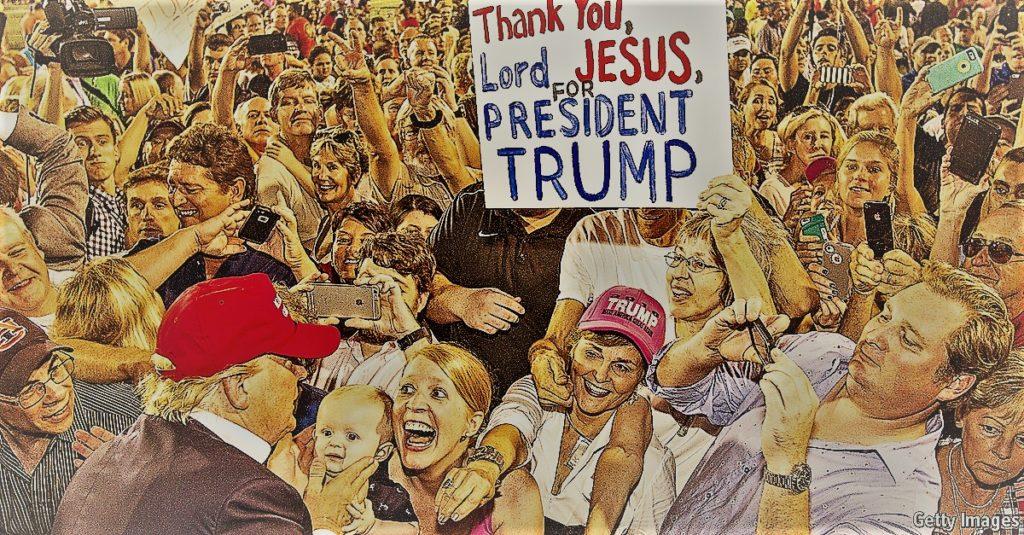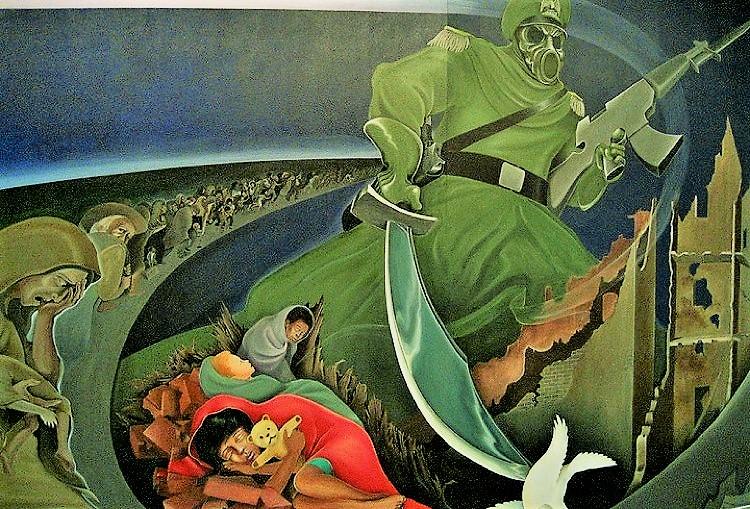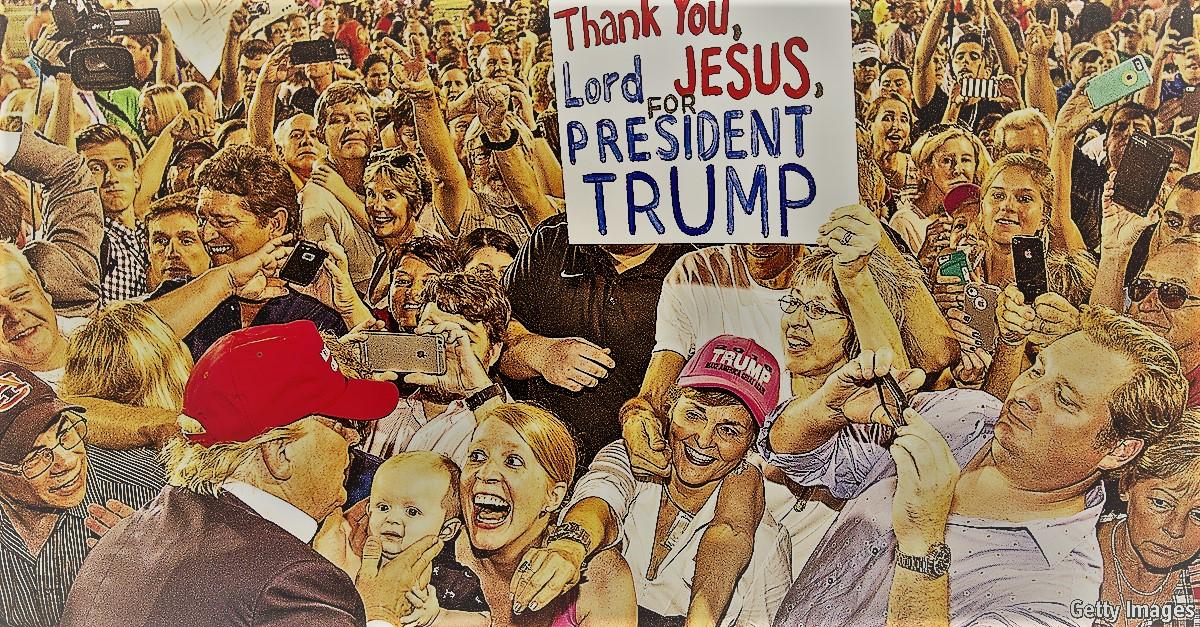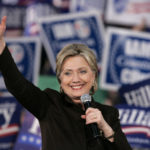Serge Halimi writes on how the Right-Wing has used an elite billionaire to channel fake-anti-elitism into anti-intellectualism, to make people resent the smugness of ‘cultural elites’ [read:Liberals]. Now the financial elites control everything and everyone else can go to hell.


Trump, the Know-Nothing Victor
By Serge Halimi, Published in Le Monde Diplomatique
At least least there’s one country where elections produce swift results. Since Donald Trump’s victory, the Mexican peso has collapsed, the cost of mortgages has risen in France, the European Commission has eased its demand for budget austerity, Japan feels encouraged to re-arm, Israel is hoping that the US embassy will move from Tel Aviv to Jerusalem, opinion pollsters and proponents of campaign micro-targeting have kept their heads down, what little remained of journalistic credibility is all but gone — and the Trans-Pacific Partnership (TPP) is dead.
A whirlwind of events and speculation makes many Americans feel as if they are living in a disturbing dream: if a man almost universally described as incompetent and vulgar has managed to become president of the United States, then anything is possible. Global contagion from the US election seems conceivable, such is the worldwide attention its unexpected result has attracted, and not just from foreign policy experts.
In the past decade, there have been many electoral surprises of this sort, almost always followed by three days of soul-searching from the leaders found wanting, and then by the quiet resumption of discredited policies. The persistence of such a lack of understanding — or the repetition of such a sham — is easier to comprehend when so many of the protest voters live far from the big centres of economic and financial power, and also far from the centers of the arts, media and the universities. Hardly anybody voted for Trump in New York and San Francisco; London massively rejected Brexit in June; two years ago Paris returned its left-wing municipality to power in an election in which the right triumphed nationally. As soon as the election is over, the fortunate people feel entitled to go on governing in their cosy clique, ever attentive to the recommendations of the press and the European Commission, always prompt to ascribe to the refractory voters psychological or cultural deficiencies that disqualify their anger. Are they anything but know-nothings, easy prey for demagogues?
This sort of perception goes back a long way, particularly in educated circles. Recent analysis of the ‘authoritarian personality’ of Trump’s blue-collar voters resembles the psychological portrait that Cold War guardians of the intellectual order produced of ‘subversives’ on both right and left. Analysing the prevalence of such subversive elements in the working class as opposed to the middle class, the American political scientist Seymour Martin Lipset concluded in 1960 that ‘the lower-class individual is likely to have been exposed to punishment, lack of love, and a general atmosphere of tension and aggression since early childhood — all experiences which tend to produce deep-rooted hostilities expressed by ethnic prejudice, political authoritarianism and chiliastic transvaluational religion’ (1).
In 2008, eight years before Hillary Clinton consigned half of Trump’s 62 million voters to a ‘basket of deplorables’, Barack Obama attributed the paradox of Republican voters among the working class to the fact that people vote against their own interests out of frustration, ‘and it’s not surprising then they get bitter, they cling to guns or religion or antipathy toward people who aren’t like them, or anti-immigrant sentiment or anti-trade sentiment as a way to explain their frustrations.’ Frustration versus reason: educated people, often convinced that their preferences are the only rational ones, are disconcerted by philistines who distrust them.
‘And if the people have no clue?’
Nothing provides a better example of what the sociologist Pierre Bourdieu called ‘the racism of intelligence’ (2) — increasingly prevalent among left-wing neoliberals but also radical intellectuals and university teachers — than an article on the website of the prestigious magazine Foreign Policy. If the title — ‘Trump won because voters are ignorant, literally’ — didn’t make the thrust instantly clear, the introduction removed any doubt: ‘Democracy is supposed to enact the will of the people. But what if the people have no clue what they’re doing?’ (3).
As you would expect, a battery of statistics and powerful arguments supported the thesis. Its author, philosophy professor Jason Brennan, pulled no punches: ‘OK, so that just happened. Donald Trump always enjoyed massive support from uneducated, low-information white people. As Bloomberg Politics reported back in August, Hillary Clinton was enjoying a giant 25 percentage-point lead among college-educated voters going into the election. In contrast, in the 2012 election, college-educated voters just barely favored Barack Obama over Mitt Romney. Last night we saw something historic: the dance of the dunces. Never have educated voters so uniformly rejected a candidate. But never before have the lesser-educated so uniformly supported a candidate.’
Brennan was galvanized rather than paralyzed by an observation that confirmed him in his anti-democratic creed. Backed by ‘over 65 years’ of studies by political scientists, he was already certain that the ‘frightening’ absence of knowledge on the part of most of the electorate disqualified their choice: ‘Voters generally know who the president is but not much else. They don’t know which party controls Congress, what Congress has done recently, whether the economy is getting better or worse.’
Some voters, both Democrat and Republican, apply themselves more than others: those voters with the most tertiary education. And by the happiest chance, these well-educated people tend — like Brennan, a libertarian — to be in favor of free trade, immigration, deficit reduction, gay rights, the progressive reform of the penal system and the conservative overhaul of the welfare state. If information, education and intelligence had prevailed on 8 November, an individual as coarse and ill-informed as Donald Trump, whose ‘anti-trade and anti-immigrant agenda flies against the consensus of economists on the left, right and centre,’ would not now be preparing to leave his New York triplex in Trump Tower for the Oval Office in the White House. Didn’t he proclaim at one of his rallies: ‘I love the poorly educated’?
STORY: Shadow Trickster Trump Betrays Populism, Absconds With…


The mood of the times
There may be little point raising the objection that Barack Obama — though he taught law at the University of Chicago — was nonetheless elected and re-elected by the votes of millions of people with little or no higher education; or that many brilliant minds fresh out of Harvard, Stanford and Yale conceived the war in Vietnam, prepared the invasion of Iraq, and created the conditions for the biggest financial crisis of this century (4). Ultimately, the main interest of an analysis of the US election that leads to mistrusting the people’s lack of judgement is the way it brilliantly reflects the mood of the times, and its main attraction is its confirmation of the feeling of superiority of the (cultured) person who reads it. But it comes with a political risk: in times of crisis, the ‘racism of intelligence’ may intend to favor the reign of the meritocracy, well-educated people and experts, but instead paves the way for strongmen, more concerned with indoctrination than education.
Most commentators have preferred to spotlight the election’s racist and sexist dimensions. It matters little to them that in spite of the historic nature of Hillary Clinton’s candidacy, the gap between male and female voters has barely changed and the huge one between black and white voters has declined slightly. The documentary maker Michael Moore, who predicted Trump’s win, picked up on this on MSNBC on 11 November: ‘You have to accept that millions of people who voted for Barack Obama, some of them once, some of them twice, changed their minds this time. They’re not racist.’
Congressman Keith Ellison, a black, Muslim, progressive Democratic representative from Minnesota, pursued this tack: ‘We didn’t perform as well for Latinos or African Americans. So this idea that it’s just the white working class, I think it’s a misnomer’ (5). Ellison, now a candidate to lead his party, wants it to go ‘beyond identity politics’. So does Bernie Sanders. (Ellison was one of the few members of Congress who supported him in the primaries.) Addressing an audience of student supporters, Sanders recently concluded: ‘It’s not good enough for someone to say: “I’m a woman! Vote for me!” No, that’s not good enough. What we need is a woman who has the guts to stand up to Wall Street, to the insurance companies, to the drug companies, to the fossil fuel industry.’ Sanders was probably not preaching to the converted, the American university being one of the places where concern for diversity trumps that for equality and where cultural prejudices are as common as elsewhere, albeit inverted.
For many Democrats, everyone can be pigeonholed into a single group — though never an economic one. So if blacks voted against Clinton, they must be misogynists; if whites voted for Trump, they must be racists. Identity Democrats cannot conceive that those blacks could be steelworkers receptive to Trump’s message on protectionism, and those whites well-off taxpayers attracted by his fiscal promises to the rich.
This year, the level of education and income tilted the result more than gender or skin colour, insofar as education and income were the variables where there were the most significant changes compared with four years ago. Among non-college educated whites, the Republicans had a 25% advantage in 2012; this year it was 39% (6). Until recently, a Democratic president could not be elected without them. Given that they are a shrinking proportion of the US population (7), that their union structures are crumbling and they increasingly vote ‘the wrong way’, will some Democrats, whose strategy is to insist on the theme of diversity, be tempted to conclude that they must get elected against this group?
This is not just a political challenge in the US. The Italian historian Enzo Traverso, writing about his students on both sides of the Atlantic, noted: ‘None of them would ever admit to voting for Trump. They all say more or less the same thing: “We’re educated, respectable, intelligent — and rich. The people on the other side are rubes.” “Ugly, dirty and bad”, to use the title of the Italian movie directed by Ettore Scola … that was the language nationalists used against the working class’ (8).
But in order to castigate the rubes effectively, their critics should have some credit with them. The more they shut themselves off in opaque, abstract discourse and take refuge in empty radical-chic rhetoric, the less they will be heard in small-town America or in the America of post-industrial wastelands where the suicide rate is rising, and the prime concern is basic survival.
What Red-State Americans can do
As a result, the right has managed to turn anti-intellectualism into an effective political weapon, a cultural identity that people are willing to claim (9). In an article in The American Enterprise in 2002, widely read then and much quoted since, Blake Hurst stressed that Republicans, who ‘saw red’ (their color on electoral maps) turned the stigma of being rubes to their advantage: ‘Most Red Americans can’t deconstruct postmodern literature, give proper orders to a nanny, pick out a Cabernet with after-tones of licorice. But we can raise great children, wire our own houses, make beautiful and delicious creations with our two hands, talk casually and comfortably about God, repair a small engine, shoot a gun and run a chainsaw without fear, calculate the bearing load of a roof, grow our own asparagus, live in peace without car alarms, security guards, or therapists’ (10).
Most of the inhabitants of red America do not read a press which Trump called ‘twisted’, ‘corrupt’ and ‘dishonest’ and which audiences at his rallies used to jeer gleefully. As he lied throughout the campaign, he deserved to be fact-checked by journalists. But quite apart from the fact that the truth is neither ubiquitous nor necessarily profitable in the US press, the media’s backing for Clinton and incomprehension of Trump voters were also the product of social and cultural isolation. Nicholas Kristof, leader writer at the New York Times, reflected on 17 November: ‘There is a problem in journalism that we favor lots of diversities over economic diversity … We don’t have enough folks who grew up in working-class rural communities.’ This sociological bias has been documented and commented on in the US for the past quarter of a century, so it’s a safe bet that it isn’t going to change any time soon.
Now ‘outsider’ candidates worldwide boast about the hatred they inspire in the media. In Italy, Beppe Grillo drew a positive lesson for his party from the US result: ‘They called us sexists, homophobes, demagogues and populists. They don’t realize that millions of people already no longer read their newspapers and no longer watch their television’ (11).
On 10 November on France Inter, former PR man turned journalist Frédéric Beigbeder also spoke with disarming frankness about the loss of influence that journalists have suffered: ‘Last week I was explaining, with all the confidence of the ignorant, that Donald Trump was going to lose the US presidential election … No intellectual was able to write anything to stop him winning … Government of the people by the people is the only system under which I want to live, but what do I actually know about the people? I live in Paris and right now I’m in Geneva; I mix with writers, journalists, filmmakers. I live completely cut off from the pain of the people. That’s not self-criticism, it’s just a sociological fact. I travel in France a lot, but the people I meet are interested in culture, they’re an intellectual minority that is non-representative of the deep revolt of the country.’
California voted massively for Clinton, who had a spectacular share of the vote among the college-educated population in its most prosperous counties, which are often almost entirely white. Some Californians, disgusted by the national result, are calling for their state to secede, in a ‘Calexit’. Gavin Newsom, lieutenant governor of California and former mayor of San Francisco, a city where Trump polled just 9.78%, has a different plan: to combat the new president’s policies by teaming up with the western world’s ‘enlightened leaders’. All he has to do is find some.
Notes
(1) Seymour Martin Lipset, Political Man: the Social Bases of Politics,Doubleday, New York, 1960.
(2) Pierre Bourdieu, Questions de sociologie, Editions de Minuit, Paris, 1981.
(3) Jason Brennan, ‘Trump won because voters are ignorant, literally’, Foreign Policy,Washington DC, 10 November 2016.
(4) See Lambert Strether, ‘Three myths about Clinton’s defeat in election 2016 debunked’, Naked Capitalism, 14 November 2016.
(5) Vice News Tonight, HBO, 16 November 2016.
(6) Thomas Edsall, ‘The not-so-silent white majority’, The New York Times, 18 November 2016. The gap favorable to the Republicans narrowed among college-educated whites from 14% to 4%.
(7) They went from 83% in 1960 to 34% in 2016.
(8) Politis, Paris, 17 November 2016.
(9) See Serge Halimi, ‘US: phony culture wars’, Le Monde diplomatique, English edition, June 2006.
(10) ‘Seeing red’, The American Enterprise, Washington DC, March 2002.
(11) Quoted in the International New York Times, 14 November 2016.













